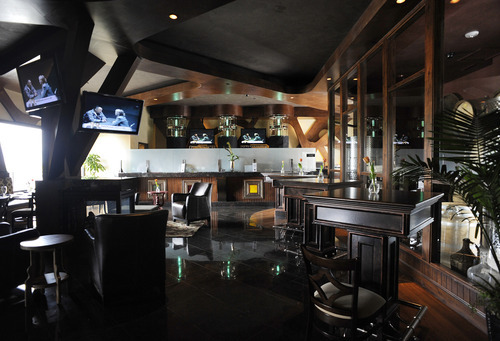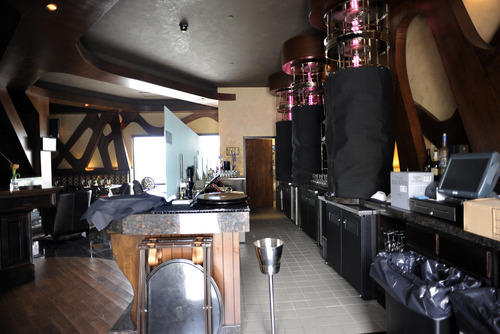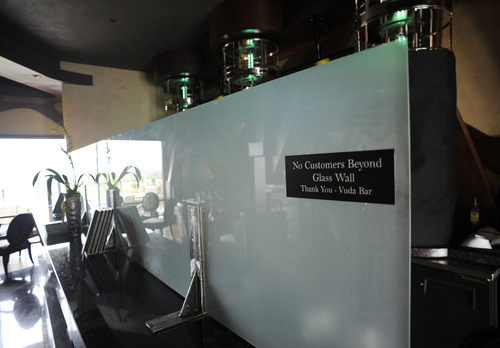This is an archived article that was published on sltrib.com in 2011, and information in the article may be outdated. It is provided only for personal research purposes and may not be reprinted.
Restaurants wanting to open in Utah are trying a new tactic to avoid redesigning bar areas just to comply with a state law mandating that bartenders be hidden from public view.
To cope, many businesses are forgoing applying for restaurant licenses. Instead, they are going after club permits, which don't require separate rooms for bartenders.
Problem is, club licenses are few and far between. This month, only one permit was available for 15 applicants.
But if any eatery can snag one, such licenses have more-relaxed restrictions on food-to-wine ratios than do restaurant licenses.
Taylorsville Mayor Russ Wall appeared before the Alcoholic Beverage Control Commission on behalf of 'Bout Time Pub & Grub, whose owner has been waiting for a club permit since December. Although commissioners awarded the only available permit to the Taylorsville eatery Thursday, the pub's West Valley City location must make do with its existing restaurant permit.
The restrictions come as the state's demographics tilt toward more imbibers and non-Mormons who don't have the same religious prohibitions against drinking alcohol. Legislative auditors have noted that gallons consumed in Utah from 2001 to 2009 jumped by 54 percent —more than double that of the population increase.
Utah's changing demographics were underscored last week when Harmons became the first supermarket chain to be awarded a liquor permit. The grocer's Draper and Farmington stores may now serve alcohol at the two locations' cooking schools and during wine-tasting classes.
In the restaurant sector, owners say they cannot continue operating or they will have to lay off employees if they cannot get a club permit.
Draper's Vuz Restaurant is a case in point. Because of the club-permit bottleneck, owner Mohsen Asgari had to settle for a restaurant license when he opened in April. That permit required him to move bartenders away from the bar lounge and to tell customers that he cannot serve them a drink unless they order food.
And with expensive wines from his cellar, he also struggles to meet mandates that 70 percent of his restaurant receipts must be for meals. Without a club permit, Asgari says he will have to lay off some employees because he cannot continue to shoulder a $45,000 payroll every two weeks.
"I don't want to tell people that they won't have jobs," Asgari said. "But with the size of our operation, a restaurant license doesn't work."
Dimitri Golesis has been waiting for a club permit since last fall when he opened Yorgio's Fine Dining in Holladay. He also has to make do with a restaurant license, which he says has harmed his business at 6121 S. Highland Drive.
"We went from being open seven days a week to just on the weekends," Golesis said. "People like watching bartenders mix drinks, so our concept was to have people sit at our 26-foot bar and watch sports.
"But with no bartender in sight, few of our customers want to sit at what is now just a counter."
Casey Bulkley, manager at Silver in Park City, said out-of-state guests expect an upstairs bar area where they can enjoy a cocktail before or after dinner. Before Silver received a club license, servers had to explain to customers why they couldn't watch bartenders mix drinks, "which left a negative impression about Utah," he said. The restaurant at 508 Main St. has a seasonal club license, and Bulkley is confident the restaurant will get a winter or year-round permit when the summer permit expires in the fall.
The number of club licenses is based on Utah's population, and because of inflated estimates, it could be months before additional permits become available. Although lawmakers approved increasing the number of restaurant permits, they stopped short of relaxing club-license quotas.
The Utah Restaurant Association has said the barrier law favors existing restaurants and is pushing for uniform regulations. But there are fears in the industry that lawmakers might force existing restaurants to also hide bartenders to achieve uniformity.
Twitter: @DawnHouseTrib







